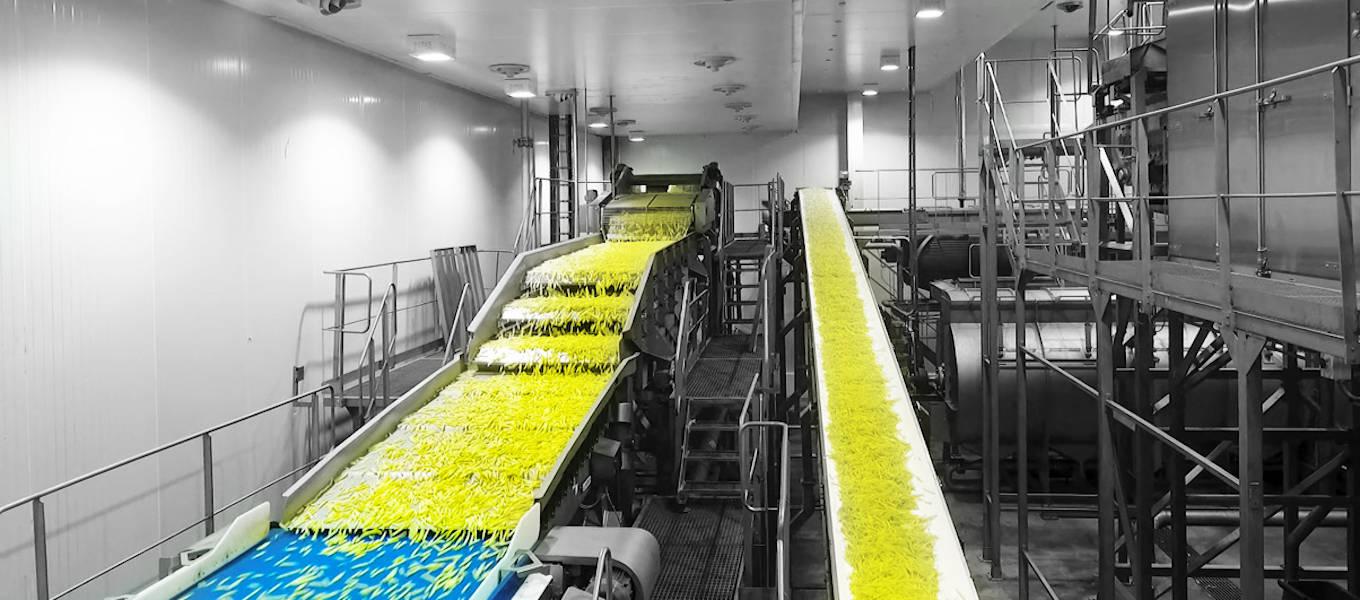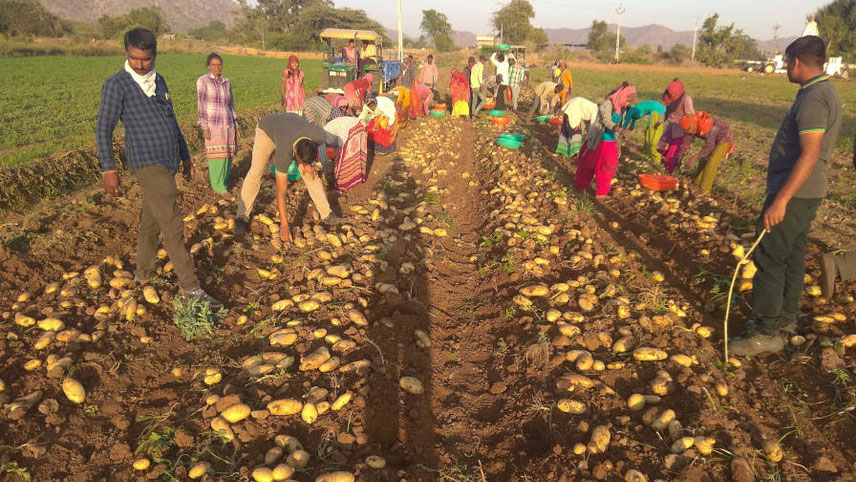Contract farming model
Experts are of the view that, owing to stringent regulations in terms of food safety and higher capital requirements for building reliable infrastructure to store frozen foods, the threat of new entrants remains low in this market. Moreover, the presence of established players like ITC, McCain Foods, Mother Dairy and Godrej Yummiez has further increased the entry barrier for new players to establish their businesses. However, the intensity of rivalry among established players is high. Frozen food products are mostly undifferentiated and, hence, market players compete in terms of pricing and brand loyalty.
For HyFun, producing high quality products through high quality ingredients and processes has been the key differentiating factor. The company works on the farm-to-fork model, essentially procuring seeds, to farming, storing, and processing potatoes, to delivering delicious frozen snacks with a hygienic and seamless infrastructure in-house.
To maintain the quality of its raw material, potato, and ensure its steady supply, the company, under its contract farming model, has tied up with 2,500 farmers (across 13,000 acres) in the northern part of Gujarat. Under the agreement, farmers sell an annual volume of nearly 1,75,000 tonnes to HyFun at a price fixed before planting, based on a cost-plus model and, hence, earn a risk-free steady income. On an average, over the last five years, farmers under the agreement have earned Rs1,27,000 per acre against the Rs84,000, earned by other farmers who are not covered by such an agreement.
Under the agreement, HyFun provides farmers with quality seeds at subsidised rates with credit support, ensuring limited additional costs and consistent output quality. Farmers are also provided agronomy services and other extension services, including guidance for soil preparation, planting, farm management and advisory on inputs, harvesting and post-harvest handling. With such training and advisory on quality inputs, farmers have achieved more than 15 per cent increase in productivity.
“In India, where our extension services are below the expected level, contract farming, if implemented in a true spirit, can go a long way in resolving the multiple challenges faced by our farmers. At a time when the government is talking about increasing the income of farmers, a concept like contract farming could be one of the options to be sincerely encouraged. We already have multiple case studies to take a cue from. It could be a win-win situation,” says Vijay Sardana, an agricultural economist.
“For the last five years, the farmers who have been working with us have gained significantly. Their income has improved and they are happy to be part of this arrangement. We provide them with all possible assistance, from agriculture inputs to finance support and, in return, we get the right kind of potato for our products. This is a special variety of potato and the northern part of Gujarat is best suited for growing these potatoes, which can be processed for high quality frozen products,” says Karamchandani.
“In the last decade or so, India has made good progress in the production of French fries, one of the most popular frozen potato products in the world. At HyFun, we have made impressive headway, emerging as one of the major suppliers to South East Asian markets. Our products are well-accepted in these markets which, in the past, have mainly sourced French fries from the US and the EU. In fact, we at HyFun are ramping up our production in a big way to make a significant dent in these markets, going forward,” adds Karamchandani.
His family decided to get into the frozen foods business after they had spent over six decades trading in potatoes and onions (a business worth Rs150 crore) but did not envisage the possibility of growth in their traditional trading business, which was being undertaken by their family-run entity Asandas & Sons, which continues to be the holding entity for the present frozen foods business.
In 2015, the family forayed into the frozen foods business under the brand name HyFun, setting up a 35,000-tonne processing facility for French fries. The capacity was subsequently increased, even as other products were also added to the portfolio, with the market responding quite positively.
World class facility
“For our family, getting into the frozen foods business was a conscious move due to the limited scope of our trading business. Moreover, we got into this business as an extension (forward integration) to our family business of trading in potatoes which is primarily the raw material for us now. Further, we could easily see the way the frozen foods market was shaping up in the country and the emerging opportunity in the global market as well,” states the HyFun CEO, who believes that the company’s emphasis on adopting the best technology towards the production of high-quality products has been rewarding and has helped the company in establishing itself strongly in the market.
HyFun is proud of its world class processing/manufacturing facility. The entire plant and machinery as well as the technology, is imported from the Netherlands, which is globally known for its production of French fries. Fully automated lines ensure the final products are completely safe. The company’s manufacturing practices and hygienic excellence match global standards, which led to HyFun being certified AA grade from BRCGS. During the ongoing pandemic, the management has also implemented stringent screening and monitoring of all employees and food handlers and has made sure everyone practices social distancing norms.
With all these developments in place, HyFun Foods is all set to establish itself quite strongly in the frozen foods market which is growing at a rapid pace and is expected to maintain its momentum going forward as well. During this Covid-19 period too, when other businesses are facing headwinds, packaged and convenience foods have done remarkably well, since households, being confined to their homes, have increasingly looked for these options. Moreover, Indian consumers, over the years, have also evolved and look at ready-to-cook frozen goods as suitable and convenient options. The advancement in the technology to manufacture these products has also helped in eliminating some of the myths and doubts in the mind of Indian consumers who are traditionally known for preferring freshly-cooked foods.
Apart from favourable market conditions, what has helped HyFun is the fact that the company has focussed on manufacturing high-quality products and for that it has invested heavily in putting up a modern and integrated processing facility where the entire production line is fully automated. On the raw material side, apart from enjoying the family knowledge of trading in potatoes, the company has entered into contract farming with farmers to maintain quality and consistency in its potato supply.
The company has positioned itself quite well in the B2B market in a short span of time. It is now looking to foray into the retail market. All said and done, it remains to be seen how the company progresses to its next growth phase, even as the market also becomes more competitive in nature.




































